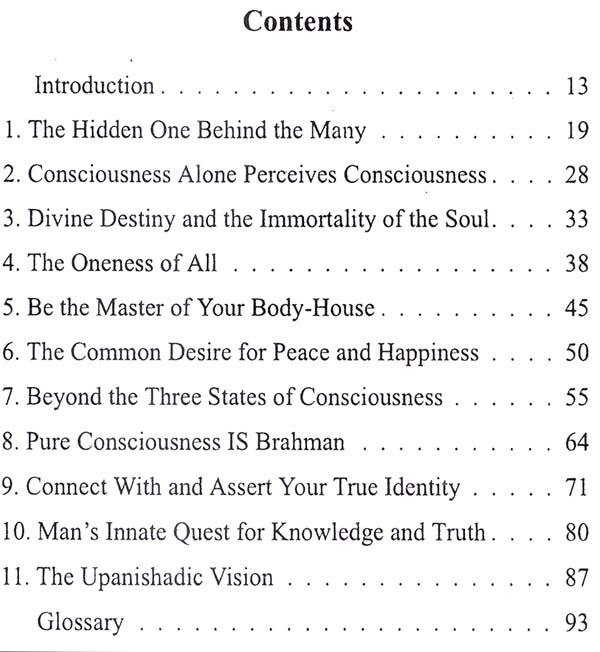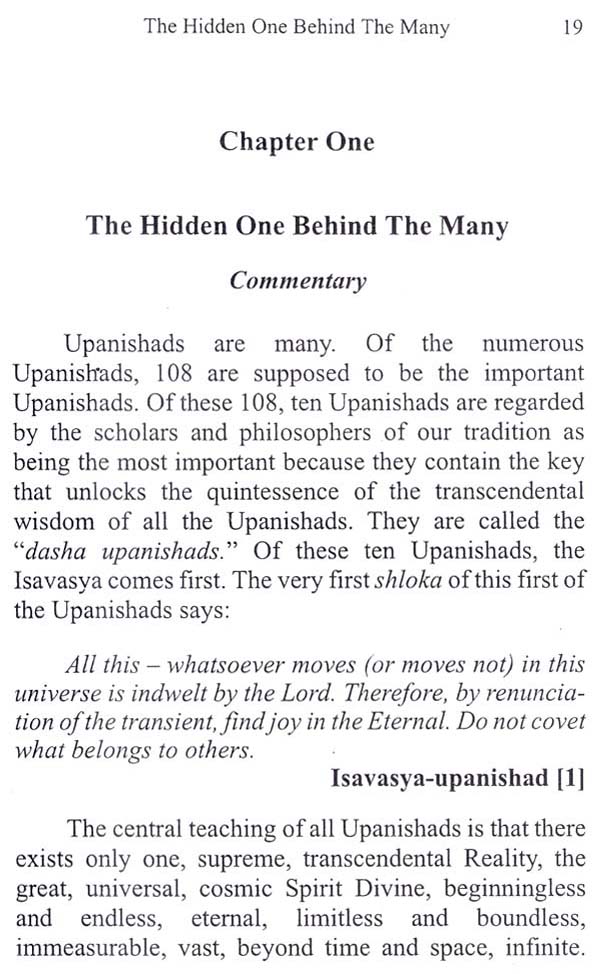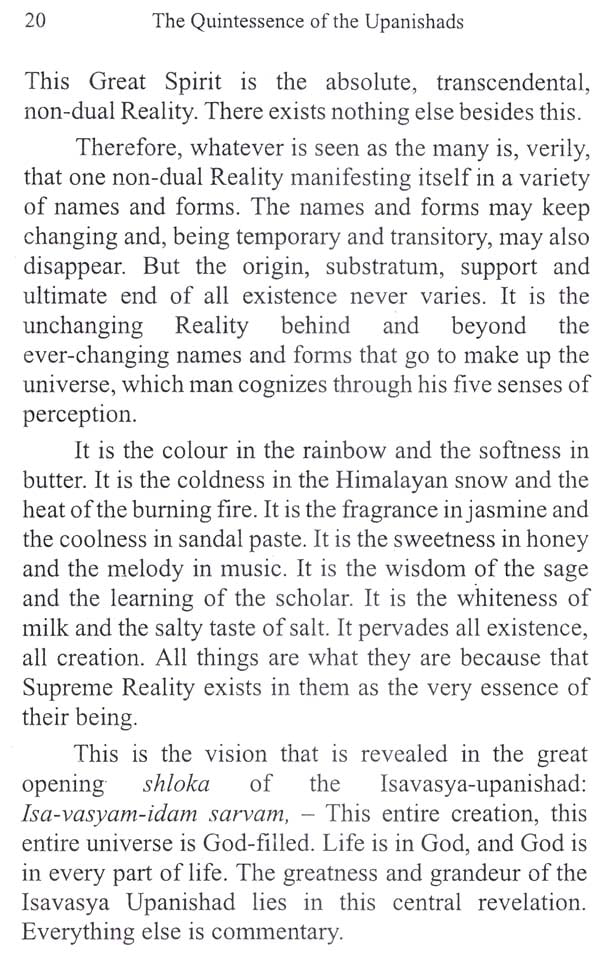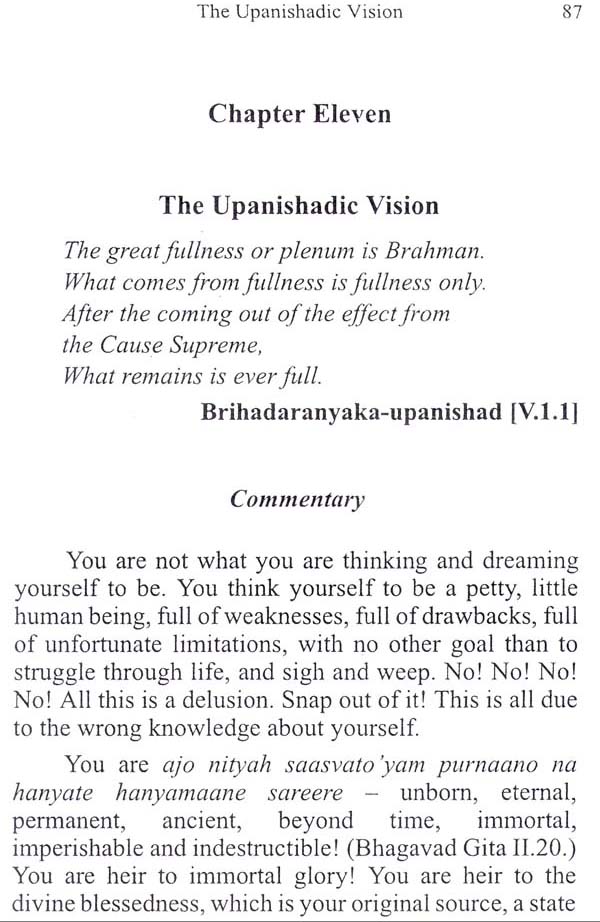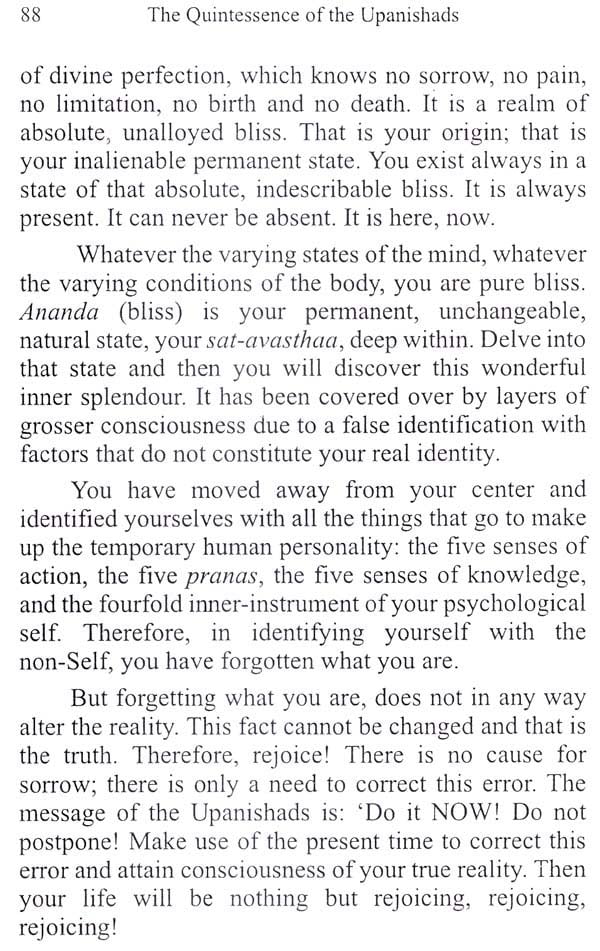
The Quintessence of The Upanishads
Book Specification
| Item Code: | NAZ856 |
| Author: | Swami Chidananda |
| Publisher: | THE DIVINE LIFE SOCIETY |
| Language: | English |
| Edition: | 2020 |
| ISBN: | 8170522188 |
| Pages: | 100 |
| Cover: | PAPERBACK |
| Other Details | 7.00 X 5.00 inch |
| Weight | 90 gm |
Book Description
Worshipful homage unto the supreme, eternal Reality, the one, absolute, transcendental, cosmic Spirit Divine that shines as an eternal Light beyond all darkness! By virtue of the fact that It is transcendental, absolute, one and non-dual, It is present everywhere, encompassing all by Its infinity. Therefore, all existence is Its own manifestation, as it were, is Its own expression. For there can be no other. May the grace of that Being be upon us all!
Om Paramatmane Namah! Salutations to the illumined seers and sages of the sacred Upanishads, who have blessed all humanity with the priceless, eternal treasures of spiritual knowledge and divine wisdom-experience! My reverential prostrations to the holy brahma-vidya gurus of the ancient Vedic era! I bow to the exalted memory of towering personalities, like Sage Yajnavalkya, Maharshi Veda Vyasa, Vasishtha and others of high spiritual stature, who contributed their precious wisdom-teachings to enrich the jnana-kanda of the Upanishads for the enlightenment of humanity upon this planet Earth.
Last, but not least, in this unbroken line of brahma-vidya gurus, my adorations at the divine lotus feet of Satgurudev Parama Pujya Sri Swami Sivanandaji Maharaj, who was an illumined brahmanistha, (ever established in Brahman). Gurudev lived, moved and had his being in that Supreme Reality always; and he adored that Supreme Divinity in and through everything he did. Even the minutest action constituted a supreme, glorious worship of the Divine. If we may use the expression "God-filled," then Gurudev was a God-filled being.
Through his radiant personality, his effulgent countenance and his sparkling eyes, he gave us some little faint glimpse of that great glory in whose experience he was firmly established. He shone with a light that is Divinity.
This direct experience of the Truth, aparoksha'nubhuti, which Gurudev constantly experienced, made him completely, transparently innocent and simple. He was a sage of wisdom, — people in and around Rishikesh and Haridwar knew him as a towering Vedantic figure, — but his svabhava was childlike. His heart was filled with love for all existence, for all the beings and creatures in this world.
Every moment of his life, every breath he took, was dedicated to the sole purpose of awakening a sleeping and slumbering humanity into an awareness of its true eternal identity, of leading people out of the vale of sorrow, pain and suffering in which they found themselves and, by imparting spiritual knowledge, guiding them into a permanent state of blessedness and peace. May his blessings be upon you all!
From time immemorial, in this sacred land of Bharatavarsha (India), a living stream of spirituality, a living stream of atma-sakshatkara (Self-realization) and aparoksha' nubhuti (direct experience of the Truth) has been flowing continuously as a silent, unseen, inner current for thousands of years. Our religion is not derived from any prophet, messiah or similar historical personality as its author, but from an ancient collection of transcendental wisdom teachings whose origins are shrouded in antiquity.
Over millennia, illumined souls successively recorded their experiences thereby adding to this precious mine of wisdom that came to be known as the Upanishads. The Sanskrit word Upanishad comes from the verb shad, to sit, and upani, near or beneath; it connotes a sitting near, or at the feet of an illumined spiritual master who is a knower of Brahman.All of the Upanishads taken together are called the Vedanta, because they comprise the jnana-kanda, the wisdom teachings of the ancient rishis, which are found in the culminating portion of the Vedas: 'Vedanta' means literally the end portion of the Vedas. The jnana-kanda of the Vedas is the record of the transcendental experiences of the ancient rishis and about what happens to the seeker when he attains that experience.
